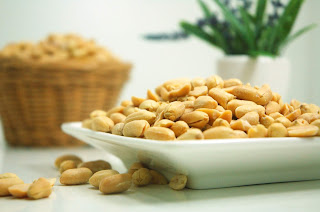Peanuts are one of the
most popular nuts in the world, it can also
be call groundnut, earthnut, gooper, runner peanut, Spanish peanut,
Mani. peanut
is a seed of the subterranean fruit of the peanut pant
(Arachis hypogea), an annual herbaceous plant of the botanical
Leguminosae measuring 30 to 40 cm in height. The botanical
definition of a “nut” is a fruit whose ovary wall becomes hard at maturity. Using
this criterion,
the peanut is not a typical nut. However, for culinary purposes and in
common English language usage, peanuts are usually referred to as nuts.
Preparation and
use
- Roasted: it is usually okay to roast peanuts 5 to 10 minutes if they have been shelled and 14 to 20 minutes if they are not.
- Fried in Oil: peanuts can be fried and it was observed that fried peanuts are always tasty.
- Peanut Butter: this is blending peanut to a homogeneous paste.
- Peanut flour: in some countries it is mixed with wheat flour to produce highly nutritious bread and other baked goods. It is certain that peanut is one of the most nutrient dense food available.
- Crushed peanut may be use to make peanut candies known as kuli kuli is western part of Nigeria.
Nutrient Composition of Peanut
Peanuts are good
source of protein, carbohydrate, healthful fat, fiber, potassium,
phosphorus, magnesium,
b vitamins, folate, vitamin E, niacin. According to United State
Department of Agriculture (USDA), 100g of peanut will give 567 kcal of energy.
Peanut offer great benefit especially to heart health Peanut contain no
cholesterol. In Nigeria, peanut oil could be extracted and use for cooking
which is very healthy.
Important Benefits of Peanut
According to an article review by Katherine Marengo LDN,RD, peanut has three main health which include :supporting heart health, maintaining a healthy weight and managing blood sugar.Supporting heart health
Peanut has less saturated fat and most of it fat are monounsaturated fatty acid and poly unsaturated fatty acid which made it more heart friendly. In study carried out in 2014, shows that 46g of peanut per day may improve heart health in people with diabetes.
Maintaining Healthy weight
A large scale study found that eating peanuts and other nuts may reduce the risk of obesity. Owning to its healthful fat, protein, fiber and carbohydrate composition, it can be a good snack and taking it in moderation may help maintain healthy weight.
Managing blood sugar
Peanut has low glycemic index, meaning they don’t cause big elevation in blood sugar level. It has a GI score of 23, nutritionist/dietitian see a GI score of less than or equal to 55 as low and this made it fit to be a snack of choice when managing blood sugar. A particular research suggest that eating peanut may help women with obesity and type 2 diabetes risk to manage their blood sugar level.
|
Water
|
6.0g
|
|
Energy
|
567kcal
|
|
Protein
|
25.8g
|
|
Total lipid
|
49.2g
|
|
Carbohydrate
|
16.13g
|
|
Fiber, total dietary
|
8.5g
|
|
Sugar
|
4.72g
|
|
Calcium
|
92mg
|
|
Iron
|
4.58mg
|
|
Magnesium
|
168mg
|
|
Potassium
|
705mg
|
|
Sodium
|
18mg
|
|
Zinc
|
3.27mg
|
|
Thiamin
|
0.64mg
|
|
Riboflavin
|
0.13mg
|
|
Niacin
|
12mg
|
|
Vitamin B6
|
0.34mg
|
|
Folate
|
240ug
|
|
Vitamin E
|
8.33mg
|
|
Saturated fatty acid
|
6.3g
|
|
Monounsaturated
fatty
acid |
24.4g
|
|
Polyunsaturated
fatty
acid |
15.6g
|

Very good information..Thanks !
ReplyDeletePeanuts contain a lot of Biotin which I think is missed here
ReplyDelete